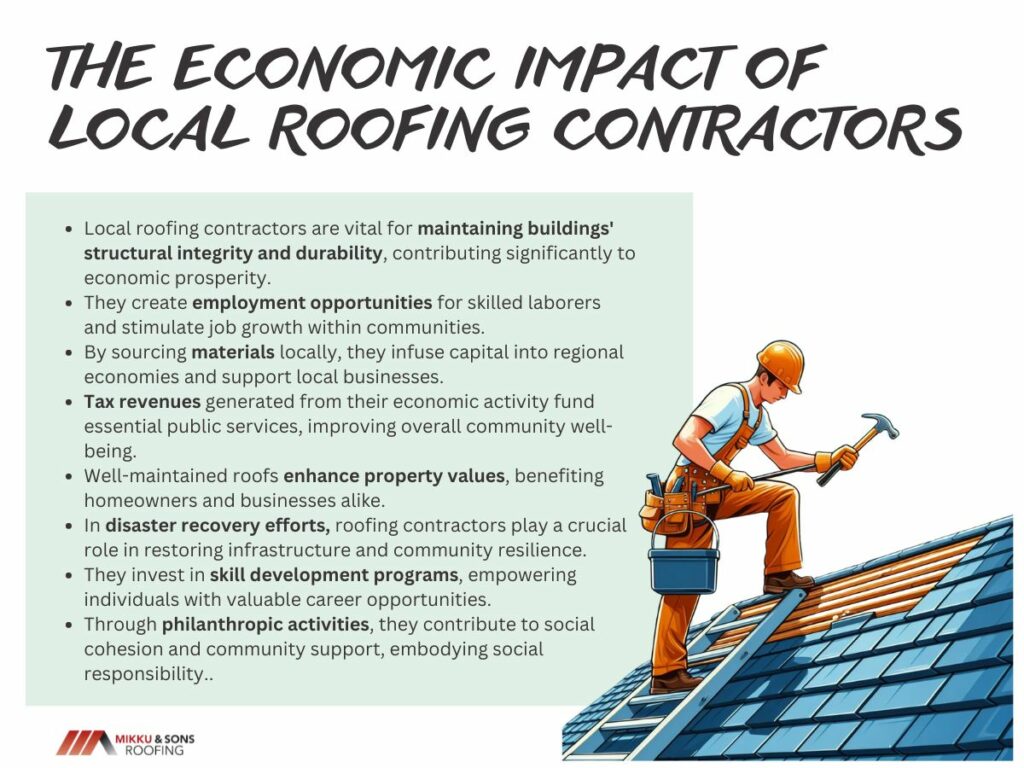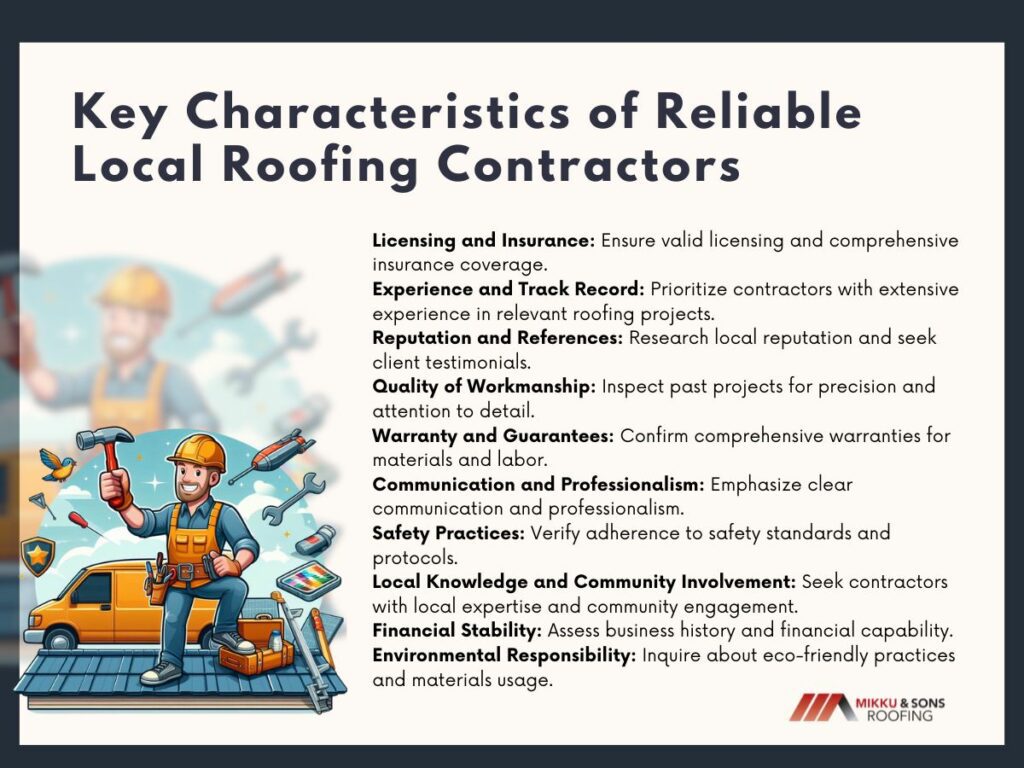

Within the construction industry, roofing contractors hold a pivotal role in ensuring the structural soundness and longevity of buildings. However, their significance transcends mere construction tasks, as they contribute substantially to economic prosperity at both local and regional levels.
This article explores the multifaceted ways in which local roofing contractors enrich economies, from job creation to community development, thereby illuminating their integral position within the economic fabric of society.
Roofing contractors are vital construction industry members, safeguarding buildings' structural integrity and durability. Yet, their contributions extend beyond maintenance and construction, significantly bolstering economic prosperity locally and regionally. They drive job creation, support local suppliers, and stimulate community development, leaving a lasting impact on various sectors of the economy.

Local roofing contractors are significant employers, providing jobs to skilled laborers such as roofers, carpenters, and technicians. The consistent demand for roofing services ensures a steady stream of employment opportunities within communities, bolstering economic stability and providing livelihoods for families. Moreover, roofing projects often require collaboration with other trades, further expanding job opportunities across the construction sector.
Roofing projects necessitate the purchase of materials, equipment, and services, much of which is sourced locally. By patronizing local suppliers and vendors, roofing contractors infuse capital into the regional economy. This localized spending creates a ripple effect as dollars circulate within the community, benefiting businesses across various sectors and stimulating economic growth.
The economic activity generated by local roofing contractors translates into increased tax revenues for local governments. Taxes on corporate profits, employee wages, and sales transactions contribute to funding essential public services such as education, infrastructure, and healthcare. Thus, the contributions of roofing contractors have a direct impact on improving the overall quality of life within the community.
Well-maintained roofs are paramount for preserving the structural integrity and aesthetics of buildings. Local roofing contractors play a pivotal role in maintaining and repairing roofs, thereby safeguarding property values within neighborhoods. By ensuring that homes and commercial buildings remain structurally sound and visually appealing, roofing contractors indirectly contribute to property appreciation, benefiting homeowners and businesses alike.
Following natural disasters, such as hurricanes or severe storms, local roofing contractors are instrumental in facilitating recovery efforts. They respond swiftly to assess damage, make necessary repairs, and restore roofs to their pre-disaster condition. By expediting the restoration of shelter and infrastructure, roofing contractors contribute to community resilience, enabling residents and businesses to recover more swiftly from adversity.
Many local roofing contractors invest in workforce development programs and apprenticeship initiatives to nurture skilled labor within their communities. By providing training and educational opportunities, they ensure a pipeline of qualified workers capable of meeting industry demands. These initiatives not only enhance the competitiveness of local roofing businesses but also empower individuals with valuable skills and career prospects.
Beyond their economic contributions, local roofing contractors often engage in philanthropic activities and community outreach initiatives. Whether through volunteering time and resources or providing pro bono services to disadvantaged individuals or community organizations, these contractors demonstrate a commitment to giving back to the communities they serve. Such involvement fosters goodwill, strengthens social cohesion, and contributes to the overall well-being of the community.
Through job creation, localized spending, tax contributions, and various other means, they play a crucial role in bolstering local economies and enhancing the quality of life for residents. As pillars of their communities, roofing contractors exemplify how businesses can drive economic growth while simultaneously embodying social responsibility and community engagement.
Choosing the right roofing contractor for your project is crucial to ensure the success, durability, and safety of your roof. Local roofing contractors play a significant role in maintaining the integrity of buildings within their communities. Here are several key criteria and characteristics to consider when evaluating local roofing contractors:

A reputable roofing contractor should be licensed to operate in their area and fully insured. Licensing demonstrates that the contractor has met the necessary requirements and possesses the expertise to perform roofing work safely and effectively. Adequate insurance coverage, including liability insurance and workers' compensation, protects both the contractor and the client in the event of accidents or damages.
Look for contractors with a proven track record of experience in the roofing industry, particularly in the type of roofing project you require. Experienced contractors are more likely to have encountered a variety of roofing challenges and possess the skills and knowledge to address them effectively. Reviewing past projects and seeking testimonials from previous clients can provide insight into the contractor's expertise and reliability.
Research the contractor's reputation within the local community. Seek out reviews and testimonials from previous clients to gauge their satisfaction with the contractor's workmanship, professionalism, and customer service. Additionally, ask the contractor for references and contact past clients directly to inquire about their experiences and level of satisfaction with the contractor's services.
Assess the quality of the contractor's workmanship by inspecting past roofing projects they have completed. Look for evidence of neatness, precision, and attention to detail. A reliable contractor takes pride in their work and ensures that roofs are installed or repaired to the highest standards, using quality materials and proven techniques.
A reputable roofing contractor should offer comprehensive warranties and guarantees for both materials and labor. Inquire about the warranties provided and ensure that they cover any potential defects or issues that may arise after the completion of the project. A contractor who stands behind their work with strong warranties demonstrates confidence in the quality and durability of their work.
Effective communication is essential throughout the roofing project. Choose a contractor who communicates clearly and transparently about project timelines, costs, and any potential issues that may arise. Professionalism, punctuality, and reliability are also important traits to look for in a contractor, as they contribute to a positive working relationship and project outcome.
Safety should be a top priority for any roofing contractor. Inquire about the contractor's safety practices and protocols to ensure that they adhere to industry standards and regulations. A reputable contractor should prioritize the safety of their workers, as well as the safety of your property and occupants during the roofing project.
A good local roofing contractor should have a deep understanding of the local climate, building codes, and regulations governing roofing projects in the area. They should also be actively involved in the local community, demonstrating a commitment to supporting and serving their neighbors.
Assess the financial stability of the roofing contractor to ensure they have the resources and capability to complete your project on time and within budget. Request information about the contractor's business history, creditworthiness, and ability to secure materials and equipment.
Increasingly, homeowners are seeking roofing contractors who prioritize environmental sustainability. Inquire about the contractor's practices regarding waste disposal, recycling, and use of eco-friendly materials and techniques.
By considering these key characteristics, you can confidently select a reliable local roofing contractor who will deliver quality workmanship, customer satisfaction, and peace of mind for your roofing project.
Beyond the immediate economic contributions outlined earlier, local roofing contractors offer further avenues through which they contribute to economic prosperity:
Local roofing contractors play a role in facilitating homeownership by ensuring that properties are well-maintained and structurally sound. A strong housing market, supported by quality roofing services, can attract prospective homebuyers and drive real estate transactions. As homeownership rates increase, so does economic stability and wealth accumulation within the community.
Beyond residential properties, local roofing contractors also contribute to the viability and growth of commercial establishments. Well-maintained roofs are crucial for businesses to operate smoothly and attract customers. By providing timely maintenance, repairs, and installations, roofing contractors support the continuity and expansion of businesses, thus fostering commercial growth and economic vitality.
The activities of local roofing contractors stimulate demand for ancillary industries, such as insurance, finance, and legal services. Insurance providers may offer policies tailored to protect homeowners and businesses against roofing-related risks, while financial institutions may provide loans or financing options for roofing projects. Additionally, legal services may be sought for contract negotiations, dispute resolution, and regulatory compliance, further contributing to economic activity and prosperity.
Local roofing contractors often participate in large-scale infrastructure projects, such as the construction or renovation of government buildings, schools, hospitals, and transportation facilities. By providing roofing expertise and services for these projects, contractors contribute to the development and modernization of essential infrastructure, which in turn supports economic growth, public services, and quality-of-life improvements within the community.
In an era of rapid technological advancement, local roofing contractors play a role in driving innovation and technology adoption within the construction industry. Contractors may invest in research and development to improve roofing materials, techniques, and equipment, leading to greater efficiency, sustainability, and cost-effectiveness. By embracing innovation, contractors position themselves as industry leaders and contribute to the competitiveness and dynamism of the local economy.
The economic activity generated by local roofing contractors has multiplier effects that extend beyond the initial investment. As roofing projects create jobs, stimulate spending, and generate income for workers and businesses, additional economic activity is triggered throughout the supply chain. This multiplier effect amplifies the impact of roofing projects, leading to broader economic benefits and prosperity for the community as a whole.
Consider these additional contributions, and it becomes evident that local roofing contractors play a multifaceted role in driving economic prosperity and fostering sustainable development within their communities. Through their expertise, innovation, and commitment to excellence, they contribute to the resilience, growth, and vitality of local economies in diverse and significant ways.
In summary, local roofing contractors are essential drivers of economic prosperity in their communities. While their primary role involves building, repairing, and maintaining roofs, their impact reaches far beyond their immediate tasks. They contribute to job creation, engage with suppliers, foster skill development, promote innovation, and drive infrastructure development.
Roofing contractors play a crucial role in maintaining vibrant and resilient economies through their dedication, expertise, and commitment to excellence. They are indispensable assets to local communities, vital for building and sustaining thriving economic environments.
